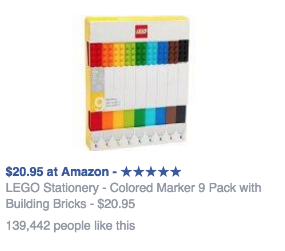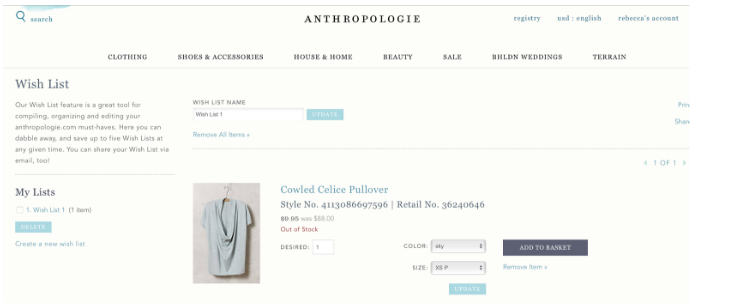2015 was the year of the customer journey, 2016 is the age of the customer. As marketers get to know customers better and we, as customers, are more connected than we ever have been, what do we really want from our favorite and most relied-upon brands, products, and services? What are some ways to improve the customer experience? Here's one perspective.
1. What ifâ¦I could silence a social or web ad and provide a reason for improved targeting?
 Scenario: I was shopping for a Lego-themed birthday present for my 6-year-old nephew on Amazon, then Amazon displayed Lego items on the right hand column of another webpage I was browsing later.
Scenario: I was shopping for a Lego-themed birthday present for my 6-year-old nephew on Amazon, then Amazon displayed Lego items on the right hand column of another webpage I was browsing later. - My wish: I could silence the ad and be presented with a survey to let Amazon know this is a once/year purchase and I'm not shopping for kids often. Maybe I set a reminder to get top rated kids products in a year for my nephew's next birthday.
- Marketer wins: Amazon saves money on ads due to irrelevance.
- Prediction: We're almost there - marketers are providing a way for customers to set a reminder and choose a date. Can we combine unsubscribe surveys or Facebook ad silence polls with Remind-Me-Later email or ad functionality to fully inform the marketer and give customers more control?
2. What if...everyone had a separate marketing inbox (not just a tab) and when a life event or shopping need arose, we could go to that library and search for coupons and promotions when the timing is right?
- Scenario: I get promotional emails year-round from a home furnishings store that I subscribed to in my personal inbox but I am not moving for another 3 months.
- My wish: My personal emails and promotional emails were not jumbled together. I don't get overwhelmed by sifting through my personal inbox to find messages from family and friends among coupons and promotional emails.
- Marketer wins: I search for and access the most recently emailed coupon when I move into my new house and I'm ready to buy. Marketing messages are more closely tied to purchase behavior and revenue. The marketer also learns more about me as a customer during each touchpoint. Promotions would need to be extended to serve customers when they need them, versus a 24-hour or 3-day event.
- Prediction: Internet Service Providers (ISPs) like Gmail have a separate tab for Promotions, but the expectation is still that consumers Open and Click (and maybe purchase) from every email. As we begin to respond to customer engagement to deliver personalized messages and create 1:1 customer journeys, we'll support a shift towards a more relevant, awareness-and-pull driven marketing approach to expose customers to new products and promotions but reduce invasiveness in personal channels.
3. What if...I could share my life calendar (without private information) with my favorite brands so I could receive the most relevant offers?
- Scenario: I have several upcoming events that may influence my purchase behavior and want to find the best promotions to control spending.
- My wish: I keep a personal calendar without personal details that my favorite brands can access, with milestones such as Tax Day, Nephew's Birthday, Mother's Day, Friend's Wedding, Upcoming Vacation, Friend's Graduation, Parents Move into New Home. A perpetual calendar has dates that are valid regardless of day, week, or year. Having a perpetual calendar as well as one with personalized and custom events could help inform marketers and keep track of life events that spark purchases. For example, a friend's wedding is coming up and a brand has access to my personal, perpetual calendar. They can share top wedding gifts with me when I need to buy one! Then, next year, they know I might be searching for an anniversary gift and can send me product recommendations for years to come.
- Marketer wins: Brands eliminate guesswork when trying to get to know their customers on a personal level and can increase relevancy by delivering promotions during the life moments, or purchase moments, that matter most.
- Prediction: While marketers could possibly use email metrics, website behavioral data, and customer service activity to infer customer wants and needs, a life calendar that is shared with retailers may be a stretch today and would require education, new tools with privacy considerations built in, and new habits to be formed.
4. What if...Most retailers had access to a brand-agnostic hub where customers to create a wishlist of products they are interested in from all of their favorite companies so friends, family, or colleagues could purchase gifts they know the customer will definitely like? What if consumers had one site with all their favorite things that links to stores where their friends and family can buy them and fulfill their wishes?

- Scenario: Finding the right gift for someone can be challenging for events other than wedding registries! Some retailers have wish lists but consumers aren't yet accustomed to personal registries or wish lists aside from baby or wedding events.
- My wish: Everyone has a personal online product/service wish list--like they do a Facebook page to make gift giving easier and make every day purchases fun occasions.
- Marketer wins: A new stream of revenue from gift purchases is created and customer loyalty builds and grows as it becomes a discovery tool for family and friends of the original loyal customer. Marketer ensures relevancy as customers share their style and preferences that can inform future messaging and promotions and timeliness is more precise and responsive to life events.
- Prediction: Companies like All I Really Want attempt to make this wish come true but requires photo upload of products, which may create a barrier. Pinterest may be the closest thing to aggregating links from multiple sites but does not appear to yet have a way for retailers to tap into this information to then trigger related messages. Companies who are emailing customers who abandon their cart could add an option to add the product to their wish list if they're not ready to buy it for themselves just yet. We're closer to this idea than we think!
What do you think? What are your wishes for the future of customer-centric marketing?
About Rebecca
Rebecca Otis is a Marketing Consultant at Salesforce, collaborating with clients to optimize their digital marketing and email marketing and mobile programs with the latest tools, technologies, and trends top of mind. She is also a blogger, writer for NBC Chicago, and speaker for groups like Goldman Sachs 10,000 Small Businesses, BlogHer, Startup Institute Chicago, University of Indiana Kelley School of Business, and DePaul University. She serves on the Social Media Club Chicago Board of Directors and was named an Austin Business Journal Women of Influence Profiles in Power Rising Star Finalist in 2012 after founding her own marketing consultancy. She's an avid Linkedin-er too. Let's connect @RebeccaOtis.

 Scenario: I was shopping for a Lego-themed birthday present for my 6-year-old nephew on Amazon, then Amazon displayed Lego items on the right hand column of another webpage I was browsing later.
Scenario: I was shopping for a Lego-themed birthday present for my 6-year-old nephew on Amazon, then Amazon displayed Lego items on the right hand column of another webpage I was browsing later. 